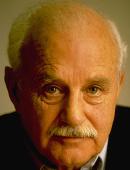|
Greenpeace
International Founder Dies in Car Crash
AMSTERDAM,
The Netherlands,
March 23, 2001 (ENS) - One of the most influential figures in
the environmental movement, the man widely credited with the
first campaign to save whales and to end French nuclear testing,
David McTaggart died in a head on car crash near his home in
Umbria, Italy, this morning.
When
news reached Greenpeace International headquarters in Amsterdam
this morning, tributes were quick to follow from leaders of the
group he helped to found.

David
McTaggart. (Photo
courtesy Greenpeace/Geier 1996)
"We
are all deeply shocked by this news," said interim International
Executive Director Gerd Leipold. "Greenpeace would not be
what it is today without his amazing force behind it."
"Greenpeace
would be unthinkable without his force of personality. He built
up the organization into the international pressure group it
is today, opening offices in the former Soviet Union and Eastern
Europe, when no one believed it possible.
"Not
only is he a great loss to Greenpeace, but also to the environmental
movement worldwide," added Leipold.
"David
had an amazing life, he shook the world," said Peter Tabuns,
executive director of Greenpeace Canada. "He fought to protect
all of us from the nuclear threat - no one did more."
In
a testimonial to McTaggart, Greenpeace described the 68 year
old as "relentless," "controversial," and
"a thorn in the side of entire governments and corporations."
"He
bears sole credit for unifying a group of internally warring
hippies into an international environmental force, and the lion's
share of the credit for Greenpeace's successful campaigns to
preserve Antarctica from oil exploitation and to halt commercial
whaling," it continued.
"He
stood as a living example of the difference an individual can
make, from his defiance of a nuclear weapons blast from the deck
of his tiny and beloved sailing ship, Vega, to his steadfast
refusal to accept that any odds were too great, or that any challenge
was too big.
"He
had the guts to make saving the planet his personal mission,
the charisma to inspire others to that task, and the strategic
savvy to make you think he just might pull it off.

David
McTaggart on board Vega in 1981. (Photo courtesy Greenpeace)
"The
world will never see another one of him."
Born
in Vancouver, Canada in 1932, McTaggart ran a successful construction
business for 20 years before sailing into a new life of environmental
action that began in the South Pacific in 1971.
So
outraged was McTaggart at the French government's decision to
cordon off international waters in order to conduct nuclear testing,
he renamed his 12.6 meter sailing craft "Greenpeace III"
and sailed to the zone surrounding Muroroa Atoll.
Dropping
anchor downwind from the planned blast, McTaggart forced the
French government to halt its test. A French Navy vessel rammed
"Greenpeace III" but McTaggart repaired his boat and
returned a year later.
On
that occasion he was beaten by French military personnel, with
the incident captured on camera by a crewmate. The photos helped
McTaggart win part of a lengthy court case against the French
in 1974, the same year, the French government announced that
it would end its atmospheric nuclear testing program.
In
1977, McTaggart began organizing support throughout Europe for
Greenpeace, by then established in more than a dozen countries.
In 1979 he united factions of the organization under his chairmanship
as Greenpeace International.
Between
1975 and 1991, McTaggart led Greenpeace campaigns to save the
whales, stop the dumping of nuclear waste in the ocean, block
the production of toxic wastes, end nuclear testing, and protect
the Antarctic continent from oil and mineral exploitation.
He
published numerous articles and two books. Awards for his contributions
to environmentalism worldwide include the Onassis Award, The
Kreisky Prize, and the United Nations Environmental Programme's
Global 500 Award.

David
McTaggart (right) with Chris Robinson and Henk Haazen (left)
sailing to Muroroa Atoll in 1995. (Photo courtesy Greenpeace/Morgan)
In
September 1991, McTaggart retired from active chairmanship of
Greenpeace International to a farm in Italy, where he raised
organic olive oil and continued to work on whaling and other
issues through his own foundation.
"He
pushed the organization hard, and the organization pushed back
hard," said a Greenpeace International statement.
"Some
of his closest colleagues will still describe him as a cold hearted
bastard, and when David retired from active leadership of the
organization in 1991, there were those who breathed a sigh of
relief.
"Many
believed the organization had outgrown his leadership, and that
the skills of a ragtag pirate leader were simply no longer a
match to an organization that had grown so large so fast.
"But
one thing Greenpeace will never outgrow was David's extraordinary
spirit."
Another
driver was killed in this mornings accident and a female passenger
injured.
|